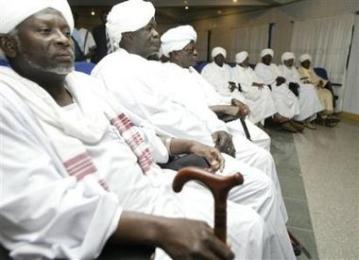Dozens of tribal chiefs arrested in South Darfur state
February 22, 2016 (NYALA) – Thirty two tribal leaders from the Falata and Salamat tribes in South Darfur state have been arrested against the background of the recent clashes between the two tribes which led to the death and injury of thirty three people.

Well-informed sources told Sudan Tribune Monday on the condition of anonymity that the security committee of the localities of Tulus, Buram and Damso invited the leaders of the Falata and Salamat to two separate meetings in Rajaj and Al-Nadheef areas where they were stripped of their mobile phones and arrested.
According to the sources, the security committee referred the tribal leaders to South Darfur satate capital of, Nyala for investigation, pointing that 32 chiefs and elders from the Falata and the Salamat were arrested.
Meanwhile, the governor of South Darfur Adam al-Faki Monday has relieved five tribal chiefs form the Falata and Habaniya tribes based on the recommendations of the commissioners of Tulus, Buram and Damso localities where clashes between the two tribes is taking place.
It is noteworthy that Al-Nadheef area which is inhabited by the Salamat tribe is part of the locality of Buram which belongs to Habaniya tribe. The Habaniya tribe was accused of colluding with the Salamat in their feud against the Falata.
Clashes between Salamat and Falata erupted in March 2015 following theft of cows in Rajaj area. At the time 67 people were killed. Also, seven people were killed in renewed clashes between the two tribes in August.
The central government admitted the failure of traditional reconciliation approach and decided stop these bloody tribal conflicts by bringing to justice the perpetrators of the attacks and through the massive deployment of troops.
Last September, a reconciliation conference was held to end the conflict between the two tribes which claimed the lives of hundreds of people.
The conflict between Falata and Salamat has forced thousands of people to flee following the burning of their villages.
(ST)
